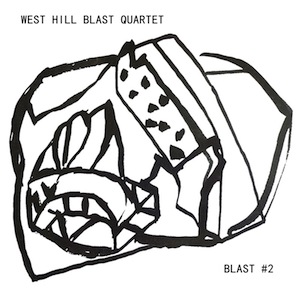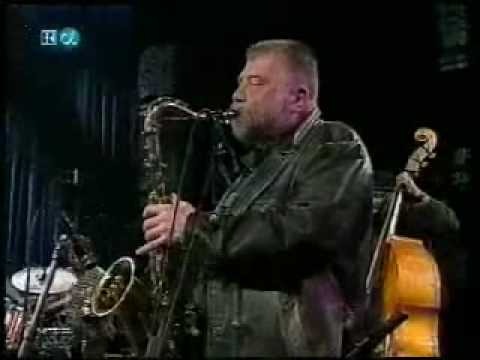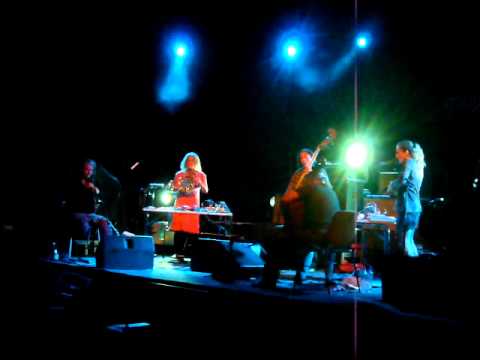Matana Roberts portrait by Brett Walker
Happy New Year: may mighty waves of cosmic love rush over you! Complete Communion’s 2015 begins with a preview of some of the fantastic live events happening in the coming weeks, not least the massively exciting Cafe Oto residency from Peter Brötzmann, William Parker and Hamid Drake. In our roundup of new releases, we review the third chapter in Matana Roberts’ remarkable Coin Coin saga, a powerful set of improv from SPUNK and Joelle Leandre, and the latest from young UK post-jazzers Troyka. Brighton’s West Hill Blast Quarter are also in the mix, as are The Thing with Thurston Moore. Finally, our reisdsue of the month is Ted Daniel’s Energy Module, a glorious document of Loft Era free jazz.
The jazz gods are clearly smiling upon Cafe Oto. German saxophone behemoth Peter Brötzmann’s residencies at the Dalston venue are always a joy – I’m still reeling from his floor-shaking shows with vibraphonist Jason Adasiewicz and the in-house rhythm section of John Edwards and Steve Noble in November – but this latest three-night run is extra special, reuniting the great reedsman with the peerless rhythm section of William Parker and Hamid Drake. This is simply one of the finest jazz trios of all time, reflecting the members’ combined lifetimes of next-level playing and listening. Parker is arguably the greatest bassist/composer since Mingus, a virtuoso and visionary whose work absorbs jazz, free improv, r & b, West African, Native American and Japanese musics. Drake is up there with Tony Allen and Jaki Liebezeit as one of the most inspiring drummers alive, maintaining an indelible sense of fluidity and groove in even the freest of contexts. The duo’s association with Brötzmann goes back to the early ’90s, when, alongside trumpeter Toshinori Kondo, they formed the formidable Die Like A Dog Quartet. These brief excerpts from a 2014 show at the Timucua white house give a tantalising glimpse of their recent live form, with Brotzmann playing a range of reeds, Parker weilding the doson n’goni and shakuhachi as well as double bass, and Drake stepping out from behind the kit to pound on a frame drum. The trio are at Cafe Oto from Tuesday 27 to Thursday 29 January. Highest possible recommendation!
Timucua white house gig:
Peter Brötzmann, Hamid Drake, William Parker at the white house -trailer- from Benoit Glazer on Vimeo.
Die Like A Dog, Berlin 1995
The coming weeks also see a UK tour from the Alister Spence Quartet, in which the Australian pianist is joined by Scottish alto and soprano saxophonist Raymond MacDonald. MacDonald’s album with pianist Marilyn Crispell was one of Complete Communion’s favourite jazz albums of 2014, and his association with Spence has resulted in some intriguing projects, most recently the electro-acoustic trio Sensaround with Shoeb Amhed. Expect lyrical and expressive contemporary piano jazz, with engaging and inventive drumming from Christopher Cantillo and sensitive, sometimes fiery, contributions from MacDonald.
Looking ahead, Cafe Oto has just announced a rare UK show from Jone Takamäki on March 4. Regular readers will recall our rave review of the reissue of the Finnish saxophonist’s stunning 1982 spiritual improv album Universal Mind. You won’t want to miss this duo gig with guitarist Lauri Hyvarinen.
Matana Roberts – Coin Coin Chapter 3: River Run Thee (Constellation)

Matana Roberts’s Coin Coin, named after the freed slave Marie Therese Metoyer, is an epic 12 part work exploring African-American history. While the previous chapters were ensemble jazz recordings – albeit a open form of jazz incorporating elements of folk, gospel, blues, post rock, opera and spoken word – River Run Thee is an extraordinary sonic collage, constructed from loops, field recordings and live overdubs. As to whether this is jazz or not, who cares? What matters is the music – and it is remarkable, weaving together saxophone improv, folk fragments, poetry, accounts of the slave trade and personal testimonies in an approach she calls ‘panoramic sound quilting’. Working from an elaborate graphic score that incorporates photographs, archival texts and musical notation, Roberts layers her own sung and spoken vocals, saxophone and electronics into a rhizomatic work that disrupts linear narratives and maps points across time. Yet for all its openness of form, River Run Thee is not some amorphous piece of sound art. It’s a deeply compelling work, with a true sense of momentum. Out of the churning mass of ghostly harmonies, echoing chatter and digital noise come arresting vocal lines, both sung and spoken. Even after a couple of listens, certain elements haunt the listener: the cracked voice Roberts uses to recite her grandfather’s poetry, the raw beauty of her saxophone lines, the uneasy contrast between the serenity of environmental recordings of the American South – bird song, church bells – and the harrowing accounts of the slave trade she reads over them. The album’s title echoes the phrase which begins and ends Joyce’s Finnegan’s Wake, and its non-linear, multi-vocal form recalls the book’s strcuture too, as well as more recent works such as M. NourbeSe Phillip’s Zong!, a remarkable poetic reconstruction of the 1781 court case following the drowning of African slaves. An astonishing work of history, memory and sensed experience, River Run Thee confirms Roberts’ place as one of the most important living artists in any field.
SPUNK & Joëlle Léandre – Live In Molde (+3Db Records)
Recorded at the 2011 Molde Jazz Festival, this is a heavyweight electro-acoustic improv session, bringing together Norwegian quartet SPUNK and French double bassist Joëlle Léandre. Over a series of group and solo features, the musicians undertake a gutsy and expressive investigation of metal, wood, circuitry and breath. The opening piece has all five musicians dive in head first, with Léandre and cellist Lene Grenager’s tectonic bow-work shaking the ground over which Hild Sofie Tafjord’s processed French horn gushes Venusian lava, and Maja Ratke’s clear voice chatters and wails. Kristin Andersen’s trumpet glints out of the torpid, churning mass, as Ratke scatters cherry bombs of digital noise amidst the squalling horns and slashing bows. Léandre’s solo tracks see her vocalising a kind of sound poetry and applying a range of extended techniques to her bass: bold pizzicato figures which vibrate into chords, fiercely beautiful bow work with irruptions of slapped and popped strings. SPUNK’s own feature changes the pace with Ratkje and Tafjord’s beautiful voices shimmering over bowed cello harmonics and long trumpet tones. It’s not unlike the Arthur Russell of World Of Echo, with the frayed edges only adding to the beauty. The final stretch is less urgent than the first, with the musicians settling into a conversational mode, but it’s still a fascinating and unusual listen.
Troyka – Ornithophobia (Naim)
Now on their third album, young British trio Troyka create a post modern hybrid of jazz, math rock and electronica suggestive of a tricksier, more abstract Battles. Their blurring of the boundaries between live playing and studio processing is taken to its logical conclusion on ‘Life Was Transient’ and ‘Troyka Smash’, where Swedish producer Eldh chops and splices live jams in into gleaming IDM prisms. On the former, crab-like guitar moves and proggy synths morph around a series of staggered rhythm tracks, while on the latter, fragments of Fender Rhodes and synth bass are placed on a matrix of micro-edited acoustic and electronic drum patterns. This collagist aesthetic informs their live playing too, such as on opening track ‘Arcades’, where guitarist Chris Montague, drummer Joshua Blackmore, and keyboardist Kit Downes make a series of gear shifts and handbrake turns sound effortless. The bulk of the track pivots between atmospheric Scandinavian piano jazz and herky-jerk fusion, before slipping into a deconstructed bluesy choogle and climaxing with a spirited jazz-rock thrash. And all this in under five minutes. It’s rather ingenious, and for this listener at least, is fleet-footed and inventive enough to be more than merely clever. But as impressive as Troyka’s technical ecstasies are, it’s refreshing to hear the band stretch out on the latter half of the album, as they channel the whip-smart blues of Miles Davis’s A Tribute To Jack Johnson on ‘The General’, and bask in the lambent glow of Fripp & Eno’s Evening Star on ‘Bamburgh’.
West Hill Blast Quartet – Blast Number 2 (Foolproof Projects)

Brighton free-jazzers West Hill Blast Quartet apply their lungs to a range of unconventional instruments on this second album: melodica, bamboo saxophone, shenai, bird whistle. Small percussion instruments add to the mix, taking the band’s classic New Thing sound into the glistening textural environments associated with Art Ensemble Of Chicago or Brotherhood Of Breath’s ‘Night Poem’. Veteran UK jazz and improv saxophonist Ron Caines is on fine form, negotiating the the rhythm section of Gus Garside and Andy Pyne’s open forms with an edgy lyricism. Bolide member and Wire scribe Daniel Spicer is the wild card, adding playful DIY/freak-folk elements with his rag-bag of small instruments. A terrific piece of underground British jazz.
The Thing & Thurston Moore – Live (The Thing Records/Trost)
Scandinavian jazz-punks The Thing and Thurston Moore go way back, but this album, recorded live at Cafe Oto in 2013, marks their first dual release. Moore and Mats Gustafsson feel their way into ‘Blinded By Thought’ with pin-prick guitar and bubbling lava sax, but it doesn’t take long for Ingebrit Haker Flaten and Paal Nilssen-Love to raise the pressure in a miasma of earth-moving fuzz bass and gallivanting free drumming. While Gustafsson anchors the ship with blasting honks, Moore augments his familiar arsenal of hectic glissandi and low-end wobbles with screaming octave leaps and Whammy pedal swoops. Taking things down a notch, Nilssen-Love cheekily slips into an early ’90s Sonic Youth shuffle (think ‘Dirty Boots’ or ‘Bull In The Heather’), over which Gustafsson and Moore work up a looping exchange of altisimmo tones and chiming harmonics. From murky primordial beginnings, ‘Awakened By Thought’ writhes into life in a barrage of muscular skronk over a broken post-punk groove. Live might not be the most inspired of The Thing’s collaborations, but it’s a satisfyingly noisy pound o’ sound.
Reissue: Ted Daniel’s Energy Module – Innerconnection (No Business)
As regular readers of this column will know, I’m a huge fan of the Lithuanian label No Business, who have been doing heroic work in documenting overlooked free jazz from the seventies onwards. This is the latest in their outstanding series of previously unreleased recordings of the 1970s Loft Scene, when free jazz went underground. Playing trumpet, flugel horn and Moroccan bugle, Ted Daniel leads an outstanding group of musicians – Daniel Carter on tenor sax, Oliver Lake on alto, soprano, piccolo and flute, Richard Pierce on drums and Tatsuya Nakamura on drums – through tunes by Ornette Coleman, Dewey Redman and Albert Ayler, adding a few original themes of their own. Their version of Ayler’s ‘Ghosts’ is incredible, with the players communing with the spirits over 15 ecstatic minutes. This glorious music underlines Sam Rivers’ observation that rather than being a destination in itself, free jazz is an open highway to new forms of expression and discovery.




